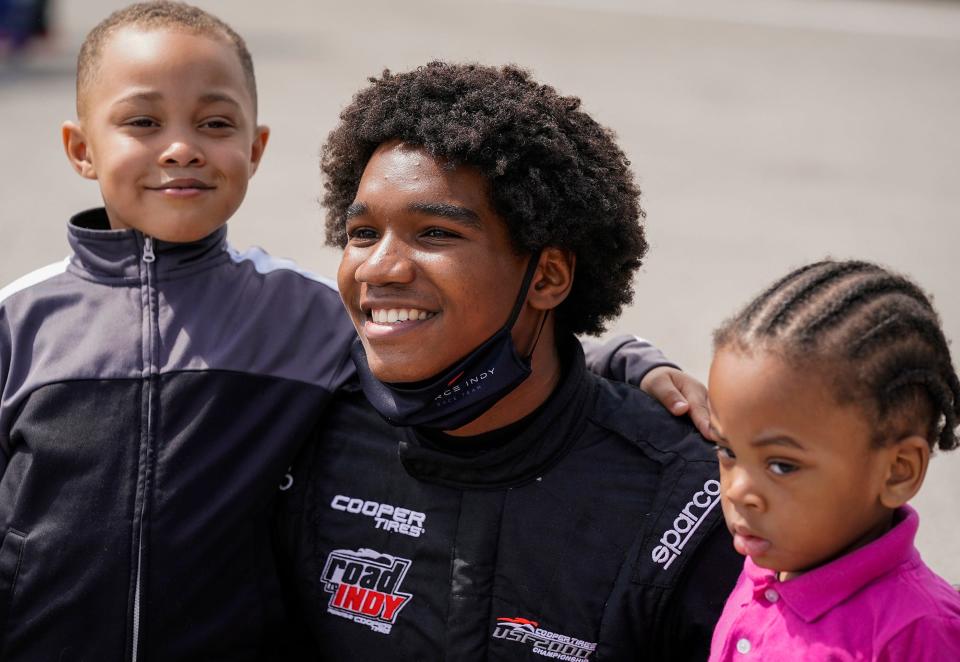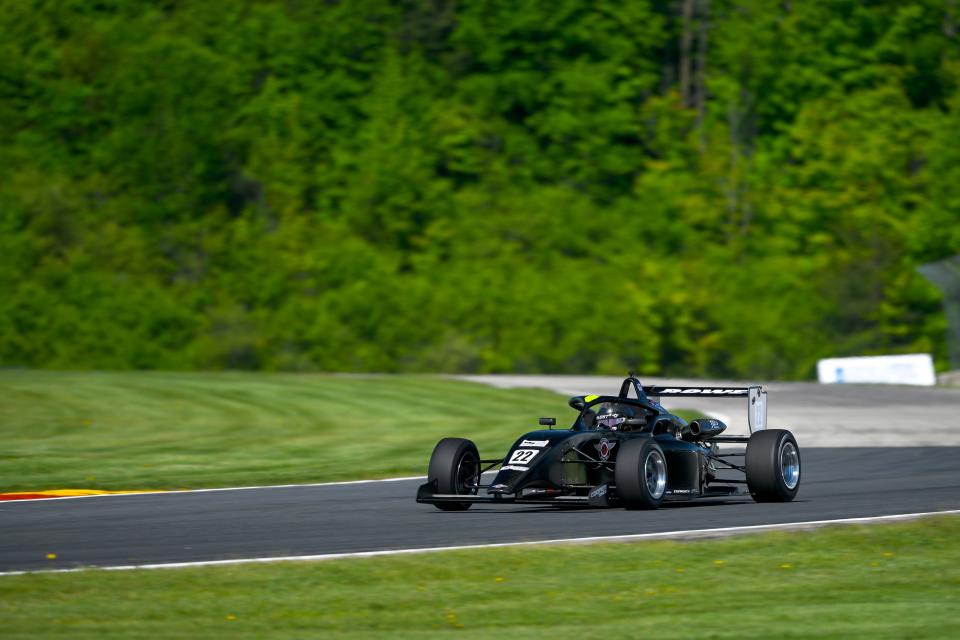Myles Rowe blazes new path as a Black race car driver, but he hopes to stand out on the Road America track

ELKHART LAKE – It’s a fine distinction.
Myles Rowe has never felt like he didn’t belong at the racetrack. But he’s also never not known he was different.
Look around the paddock.
The NTT IndyCar Series has drivers from around the United States, Canada and Mexico, from Europe and South America, from Australia, New Zealand and Japan. The three development series are similar.
But Black Americans? Rowe in USF2000 and Ernie Francis in Indy Lights are the only two of which Rowe knows competing this weekend at Road America.
“Anything that seems like a challenge, I just go headfirst into,” said Rowe, a three-time winner who will turn 22 this month.
He grew up in karting idolizing Formula One driver Fernando Alonso and drivers who have since made it, such as Charles LeClerc, George Russell and Lando Norris, and studying on-kart video from 2021 F1 champion Max Verstappen.
“I saw there were no people (in karting who looked like me), so I went, let me be that guy,” Rowe continued.
“It sucks. You shouldn’t even be thinking about it. But, yeah, it’s heavily noticeable, the lack of diversity in the paddock. It’s been getting a lot better over the last five years or so — a lot, lot better — but there’s still a long way to go.”
And Black fans? Rowe is as surprised as he is happy to see a Black child come up to say hello or ask for an autograph.
It happens, but it’s the exception. The smiles are mutual.
“I try not to make this a racial thing, but it’s a true thing,” said Rowe, an Atlanta native and recent graduate of Pace University in New York. “If you go anywhere, if you go off to China and you don’t see any Americans around, you feel alone. Yeah, we’re all Americans and it’s fine, but that sort of culture you get, there’s a lack of it and sometimes the spectators, you can see it. You feel it a bit.
“Definitely they appreciate it when they see someone who looks like them because it makes them feel like they belong, they’re supposed to be here, not just coming and going and out in the distance.”
More: IndyCar driver Rinus VeeKay came to Wisconsin to race and ended up with a second family

This bears repeating: Rowe is not complaining. He is not intimidated by or particularly uncomfortable with standing out in his sport because of his race. He genuinely enjoys racing with and being around his fellow competitors.
He’s just pointing out the obvious.
If there’s pressure on him to blaze a trail or inspire, Rowe is OK with that. Racing is about handling pressure, and if he can’t handle some more in the development divisions, how could he be expected to in IndyCar or some other high-level series?
Besides, Rowe has plenty on his plate trying to go fast, win races and stay in the series.
Rowe drove for Force Indy last season and gave the team its first victory but was left out when the team moved to Indy Lights with Francis as its rookie driver. Force Indy is owned by Rod Reid, whose NXG Youth Motorsports has introduced thousands of students from underrepresented communities to the educational benefits of racing.
Rowe landed with Oconomowoc-based Pabst Racing Services for the start of this season, won two of the first four USF2000 races and led the championship, but also ran out of budget.
Ultimately Roger Penske stepped up to provide the funding for Rowe to finish the season.
In addition to his business interests and ownership of racing teams, the IndyCar Series and Indianapolis Motor Speedway, Penske launched the Race for Equality and Change program to help to support diversity and inclusivity across the industry.
“I didn’t know if I was going to get to Indianapolis, and then at the last minute I understood that I was getting there,” Rowe said. “And still I was at Indianapolis and didn’t know if I was going to get further from that. Last minute figured out I was.
“So, Roger Penske has been a huge help for my career and my future, just being behind the Race for Equality and Change and being behind Force Indy, picking me to head the development of Force Indy and still outwardly supporting me now … still helping me get through the ranks.”
To Rowe — who is second in points heading into the Road America doubleheader Saturday and Sunday — the uncertainty of his season is an example of how the racing business model is broken at the grassroots and pay-to-play development levels.
No one gets anywhere without access to thousands, hundreds of thousands or millions of dollars.
“They need to find a way to get sponsors to the teams so the teams get the money so they can hire the drivers and therefore the teams can pick who’s talented not who has the most money,” Rowe said. “… So the teams can pick drivers that can come on and show their talent like in any other sport.”
Rowe is hopeful he can follow his racing dreams but also is a realist. He was out of the sport for four years before getting back in last season via Force Indy, and that could have been the end.
Fortunately Rowe has other passions, filmmaking the greatest of them. That’s the field in which he earned his college degree, and he has worked with a company that does video and photography projects for clients in IndyCar and sports cars.
“I’m a big believer in making your dreams a reality,” Rowe said. “Anything I have a passion for, filmmaking, racing, I’m going to go full-send for it and make it happen with all my might and all my effort that I can.”
Our subscribers make this reporting possible. Please consider supporting local journalism by subscribing to the Journal Sentinel at jsonline.com/deal.
DOWNLOAD THE APP: Get the latest news, sports and more
This article originally appeared on Milwaukee Journal Sentinel: Black driver Myles Rowe winning in USF2000 IndyCar development series

